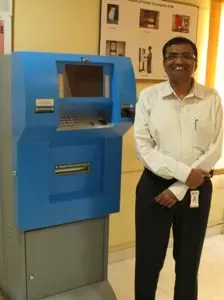Revolutionising banking in rural areas by harnessing the sun’s energy
05-January-2012
Vol 3 | Issue 1
An Indian start-up is catalysing a quiet revolution by designing, developing and installing unique solar-powered ATMs in rural areas.
The initial lot of 400 solar ATMs, aptly called Gramateller ('gram' means village), the world's largest order, placed by the State Bank of India (SBI), has been winning accolades for performance and substantial energy savings.
.webp) |
|
Solar powered ATMs are most suitable in areas, which suffer power cuts for 8 to 10 hours in a day
|
The ATMs were installed in 2010-11 across several states, usually within 20-50 km of the district headquarters, Vijay Babu, CEO of Vortex Engineering, which makes these units, told this correspondent from Chennai.
Following SBI's success with solar ATMs, the Catholic Syrian Bank also placed an order for 50 Gramatellers and Indian Bank for 20, while 10 more have been ordered by other banks, he added.
Both Babu and Lakshminarayan Kannan, who founded Vortex, are the alumni of the Indian Institute of Technology-Madras (IIT-M) and the brains behind the Gramateller.
"Our plans to operate ATMs on solar power were greeted with utter disbelief. We faced challenges initially in getting them adopted by our end users, the rural folks, who are not particularly tech-savvy. But once they realised that they were getting control of their own money, they accepted it wholeheartedly," said Babu.
"The workload has increased with more and more people using these facilities which, in most cases, are the only ATMs within 20 km or more, thanks to the solar power backup," added Babu.
The two entrepreneurs took up the project in 2004-05 at IIT-M's suggestion, developing and fine-tuning the product until it became commercially viable in 2008-09.
The IIT-M, which had been initially approached by the banks to develop a robust rural alternative to the existing ATMs, passed on the proposal to Vortex. Babu and Kannan have since inked a royalty agreement with their alma mater.
"Conventional ATMs may not be viable in areas subject to 8 to 10 hours of power cuts, given their dependence on gensets and air-conditioning. But thanks to the rural Gramateller, villagers don't have to undertake time-consuming trips to cities or towns for money," said Kannan.
Vortex is the only Indian company making it to the Time magazine 2011 list of "10 start-ups that will change your life", selected out of 31 companies honoured as "Technology Pioneers" by the World Economic Forum.
Vortex was recently selected as the latest entrant to Business Call to Action (BCtA), a global initiative that encourages private sector efforts to fight poverty, supported by the UN Development Programme, among others.
"The 'no frills' Gramateller has a 12-hour power back-up, provided there is good sunlight at least for five hours daily. Solar panels convert these rays into electrical energy, storing them in a battery.
 |
|
No frills ATM: Gramateller has a 12-hour power back up and does not require an AC room
|
“A single unit saves more than 90 percent of the yearly expenditure incurred on operating an ATM, which works out to Rs.1.44 lakh, half of the amount being accounted by air-conditioning," said Sabarinath Nair, marketing manager, Vortex.
Gramateller comes with a biometric touch pad to prevent fraud and tell villagers that their money is safe. It can also dispense soiled notes in the interiors where crisp currency notes are suspected of being fakes, Nair said.
Regular ATMs were priced between Rs.3.5-5 lakh apiece. They needed another Rs.60,000 and Rs.80,000 for the UPS and AC. Gramatellers cost around Rs.3 lakh each, which included a built-in UPS and did not need air-conditioning, he said.
Solar panels for a unit require an additional investment of Rs.1.5 lakh, but have near zero operational cost. Unlike large diesel gensets, these pay for themselves within two years.
Given Gramateller's success in harnessing solar energy and its commercial viability, several developing countries from Africa and East Asia are evincing interest in the technology, said Babu. - IANS
















